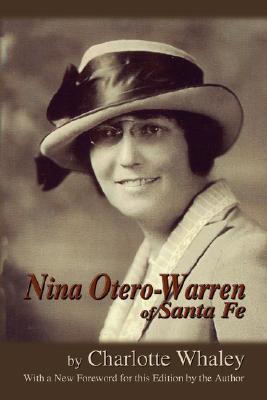"This is my favorite kind of history," writes Dick Haeberlin in "Southwestern American Literature," "the story of a person I did not know about before, one not famous but important anyway." And important she was, as this new Sunstone Press edition of "Nina Otero-Warren of Santa Fe" reconfirms. In many ways her life paralleled that of Santa Fe and New Mexico in the early years of the twentieth century. Born in 1881, Nina saw New Mexico change from a mostly rural territory of sheep and cattle ranches operated by a few Hispanic ricos, to become the 47th state in 1912 with increasing Anglo immigrant influences. Her own father was murdered by an Anglo, James Whitney, who disputed Manuel Otero's right to his land. Acre after acre was wrenched away from her family in the Anglo-dominated courts. But Nina viewed the change as inevitable and proceeded to make it work for her. She married an Anglo, Rawson Warren, divorced him after two years, declared herself a widow, and kept his name. Her hyphenated surname, Otero-Warren, opened doors for her in both cultures and enabled her to achieve most of her goals, which were varied and ambitious. Her book, "Old Spain in Our Southwest" was published in 1936, and is now available in a new edition from Sunstone Press.

"This is my favorite kind of history," writes Dick Haeberlin in "Southwestern American Literature," "the story of a person I did not know about before, one not famous but important anyway." And important she was, as this new Sunstone Press edition of "Nina Otero-Warren of Santa Fe" reconfirms. In many ways her life paralleled that of Santa Fe and New Mexico in the early years of the twentieth century. Born in 1881, Nina saw New Mexico change from a mostly rural territory of sheep and cattle ranches operated by a few Hispanic ricos, to become the 47th state in 1912 with increasing Anglo immigrant influences. Her own father was murdered by an Anglo, James Whitney, who disputed Manuel Otero's right to his land. Acre after acre was wrenched away from her family in the Anglo-dominated courts. But Nina viewed the change as inevitable and proceeded to make it work for her. She married an Anglo, Rawson Warren, divorced him after two years, declared herself a widow, and kept his name. Her hyphenated surname, Otero-Warren, opened doors for her in both cultures and enabled her to achieve most of her goals, which were varied and ambitious. Her book, "Old Spain in Our Southwest" was published in 1936, and is now available in a new edition from Sunstone Press.